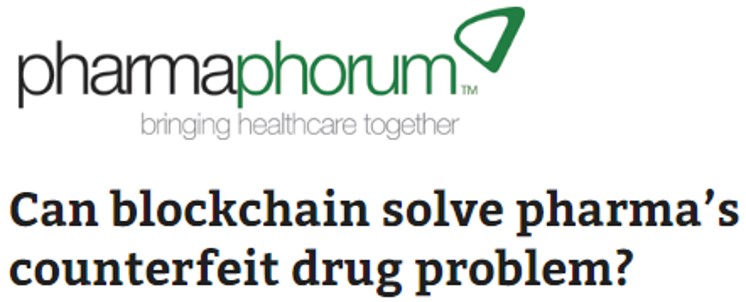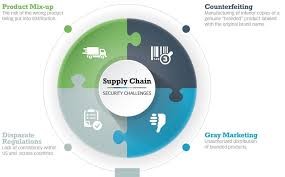How blockchain can play a part in fixing the opioid crisis
 |
One million people die from them each year.
I'm not talking about the deadly opioid crisis. I'm talking about the number of people who die each year from taking fake drugs.
Federal data show that more people died in 2017 from taking counterfeit opioids than the potent, prescription kind. As more data becomes available, we may see that trend accelerate.
But it's not just fake opioids. The market for counterfeit drugs is an international, multibillion-dollar industry.
According to the World Health Organization, 1 million people die every year from taking drugs that are fake or otherwise tainted to make them poisonous … or downright deadly.
WHO reports that in Poland, one out of every 100 pills bought — to treat conditions ranging from AIDS and allergies to baldness to weight loss — is thought to be a counterfeit.
Unfortunately, consumers think they are buying from reputable online pharmacies and other seemingly legitimate sources. But making that assumption could put you in the hospital, or worse, with the poisons you could potentially be ingesting.
 |
The lethality is because fake drugs often contain incorrect doses of active ingredients. They’re either too strong or incorrectly mixed … and some fake medicines have been found to contain traces of toxic household items like rat poison, floor wax, cement and plaster!
For example, investigators have found a large number of counterfeit pills sold as Xanax and Oxycodone contain Fentanyl.
That's the active ingredient linked to thousands of deadly overdoses and was listed as a cause of several accidental celebrity deaths like Michael Jackson, Prince, Tom Petty and, unfortunately, several others.
And no wonder the news is so bad about this drug: Fentanyl is 25 to 50 times stronger than heroin!
 |
The problem is especially acute in less-developed countries, where an estimated 30% to 70% of all the pharmaceutical drugs are fake.
Moreover, the WHO estimates that fake-drug peddlers make $165 billion to $220 billion a year from the sale of those counterfeit drugs. That makes it more lucrative than even cocaine, heroin and methamphetamines combined.
Practically every pharmaceutical company and health-safety regulator on the planet is frantically searching for a solution to reduce and, ultimately, prevent these kinds of unnecessary deaths.
In fact, a new drug safety law, the Drug Supply Chain Security Act, goes into effect in November. Drug manufactures will be required to trace every pill it makes from creation to each consumer's lips.
That's a Herculean task. But the solution is simple: blockchain.
Blockchain's transparency, traceability, and immutability makes it perfect for supply chain security.
 |
Global software giant SAP has created a new blockchain service, the Information Collaboration Hub for Life Sciences. It allows the final consigner to use the barcode of the purchased drugs to verify the serial number, product code, authenticity that was entered by manufacturer.
This data is stored on the blockchain is completely tamperproof. This will make it impossible for counterfeiters to peddle their deadly drugs.
That's not all. Blockchain offers many more benefits for the health care industry. It will:
- Create a secure place to store private patient data,
- Ease the exchange of patient information between physicians, and
- Facilitate faster, easier and more accurate billing.
This doesn't mean that you should rush out and buy SAP stock tomorrow morning. I think very highly of SAP, but it isn't the only company trying to grab a piece of this multibillion-dollar market.
Related post: Bernie Sanders is going to take 70% of your income
Software giants like IBM and Microsoft also have blockchain-based supply-chain solutions. So do some of the pharmaceutical giants like Pfizer, Novartis and Merck.
Blockchain is going to solve a deadly problem, and the companies that deliver a blockchain-based solution are going to see their stock skyrocket.
Best wishes,
Tony Sagami



